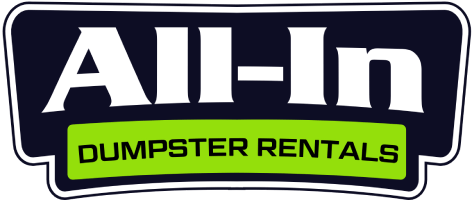At All-In Dumpster Rentals, we’ve partnered with Asheville’s construction industry for years, providing reliable waste management solutions tailored to the unique challenges of building, renovation, and demolition projects. This guide draws on our extensive experience to help contractors optimize their debris disposal processes, reduce expenses, and maintain productive, compliant job sites.
Whether you’re managing a small renovation or overseeing a major commercial build, implementing these best practices will streamline your waste management operations and potentially improve your bottom line.
Understanding Construction Debris Types and Disposal Requirements
Construction and demolition (C&D) waste encompasses a diverse range of materials, each with specific handling considerations. Recognizing these categories is the first step toward efficient management:
Common Construction Waste Categories
- Concrete, brick, and masonry: Heavy materials that may require specialized dumpsters with reinforced construction
- Wood products: Including treated lumber, which may have specific disposal requirements due to chemical content
- Drywall and plaster: Gypsum-based materials that can often be recycled but require separation
- Metals: Valuable scrap materials that should typically be separated for recycling
- Roofing materials: Shingles and other roofing debris, which are heavy and may contain asphalt
- Packaging materials: Cardboard, plastic, and other wrapping from building supplies
- Mixed debris: Combination materials that require sorting or appropriate disposal options
Local Regulations in Asheville and Western North Carolina
Buncombe County and the City of Asheville maintain specific guidelines for construction waste disposal. Key considerations include:
- Prohibited items in standard roll-off dumpsters (hazardous materials, electronics, certain appliances)
- Required separation of recyclable materials on certain project types
- Documentation requirements for proper disposal, especially for commercial projects
- Special handling procedures for potentially hazardous materials like asbestos, lead paint, or treated lumber
As your local waste management partner, we stay current on all regional regulations and can provide guidance on compliance requirements for your specific project type.
Strategic Dumpster Selection for Construction Projects
Choosing the right dumpster size and type significantly impacts both cost-efficiency and site operations. For construction projects in Asheville, we recommend:
Optimal Dumpster Sizes for Common Project Types
- 10-yard dumpsters: Suitable for small renovation projects, single-room remodels, or minor roof repairs
- 13-yard dumpsters: Our most popular size for medium renovation projects, small demolitions, or new construction finishing phases
- 15-yard dumpsters: Ideal for larger renovations, whole-house remodels, or ongoing commercial construction
Multiple Dumpster Strategies
For larger or more complex projects, consider these approaches:
- Sequential rentals: Schedule a series of dumpsters for different project phases (demolition, framing, finishing)
- Material separation: Use multiple smaller dumpsters to separate recyclables, clean wood, or metals from general debris
- Swap-out service: Arrange for full dumpsters to be promptly replaced with empty ones to avoid work stoppages
Strategic Placement on Construction Sites
Proper dumpster location can significantly improve workflow efficiency:
- Position dumpsters to minimize carrying distance from the primary work areas
- Ensure placement allows for easy access by both workers and pickup trucks
- Consider rotating placement as work progresses through different areas of the project
- Maintain clear access paths to prevent safety hazards and workflow interruptions
Cost-Effective Waste Management Strategies for Contractors
Implementing these practices can substantially reduce disposal expenses on construction projects:
Source Reduction Techniques
- Order materials with precise measurements to minimize cutoffs and waste
- Use standardized dimensions in design to reduce custom cutting
- Store materials properly to prevent weather damage and waste
- Implement just-in-time delivery to reduce on-site storage damage
Material Separation and Recycling
- Designate separate collection points for recyclable materials like clean wood, metals, and cardboard
- Train crews on proper waste sorting procedures
- Consider dedicated recycling dumpsters for projects generating substantial recyclable waste
- Explore local recycling facilities for concrete, asphalt, and clean fill materials
Donation and Reuse Opportunities
- Partner with organizations like Habitat for Humanity ReStore in Asheville for salvageable materials
- Identify reusable components during demolition phases (cabinets, fixtures, doors)
- Incorporate salvaged materials into new construction when appropriate
- Document donations for potential tax benefits
Weight Management for Heavy Materials
Since dumpster pricing is often affected by weight limits, consider these strategies for heavy debris:
- Order dedicated dumpsters for concrete, brick, or soil rather than mixing with lighter materials
- Load heavy materials in smaller amounts across multiple dumpsters when appropriate
- Explore specialized disposal options for large amounts of concrete or masonry
- Consider on-site crushing or processing for projects with substantial concrete waste
Streamlining Your Dumpster Rental Process
As Asheville’s contractor-friendly dumpster rental service, we’ve optimized our process to support your project needs:
Contractor Accounts and Benefits
- Simplified billing with monthly invoicing options
- Priority scheduling for regular customers
- Volume discounts for multiple or ongoing rentals
- Dedicated point of contact familiar with your business requirements
Communication Best Practices
- Schedule deliveries and pickups at least 48 hours in advance when possible
- Provide clear site access instructions and contact information
- Alert us to any site restrictions or special placement requirements
- Notify us promptly of schedule changes or project delays
Partner with All-In Dumpster Rentals for Your Construction Waste Needs
As local construction waste specialists serving Asheville and Western North Carolina, we understand the unique challenges contractors face in our region. Our reliable service, competitive pricing, and construction-specific expertise make us the preferred partner for builders throughout Buncombe County and beyond.
We offer:
- Same-day service availability for urgent project needs
- Flexible scheduling to accommodate your project timeline
- Clean, well-maintained equipment that reflects positively on your job site
- Local knowledge of regulations and disposal requirements
- Transparent pricing with no hidden fees
Call us today at (828) 676-1075 to discuss your specific construction waste management needs or to set up a contractor account. Our team is ready to help you implement efficient, cost-effective debris disposal solutions for your projects.
Trust All-In Dumpster Rentals as your waste management partner, and experience the difference that local expertise and commitment to contractor satisfaction can make.
